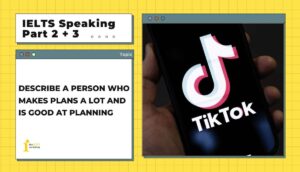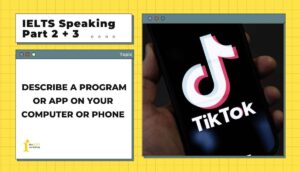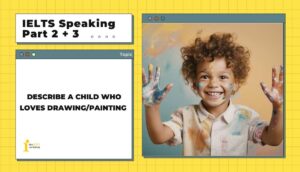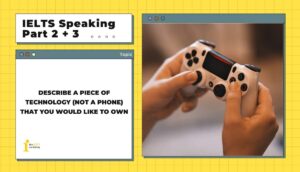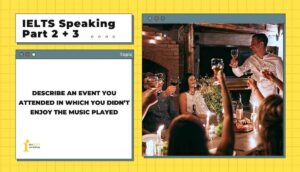Trong bài giải mẫu lần này, cô Phương Anh của The IELTS Workshop sẽ hướng dẫn bạn trả lời topic “Describe a subject that you would like to learn in the future“ trong IELTS Speaking Part 2. Cùng tham khảo sample, từ vựng và một vài cách diễn đạt ghi điểm trong phần thi IELTS Speaking nhé.
Part 2: Describe a subject that you would like to learn in the future
Describe a subject that you would like to learn in the future
You should say:
What it is
Where and how you want to learn it
Why you want to learn it
And explain if it will be difficult to learn it
Dưới đây là bài mẫu cho topic “Describe a subject that you would like to learn in the future”.
1. Bài mẫu (Sample)
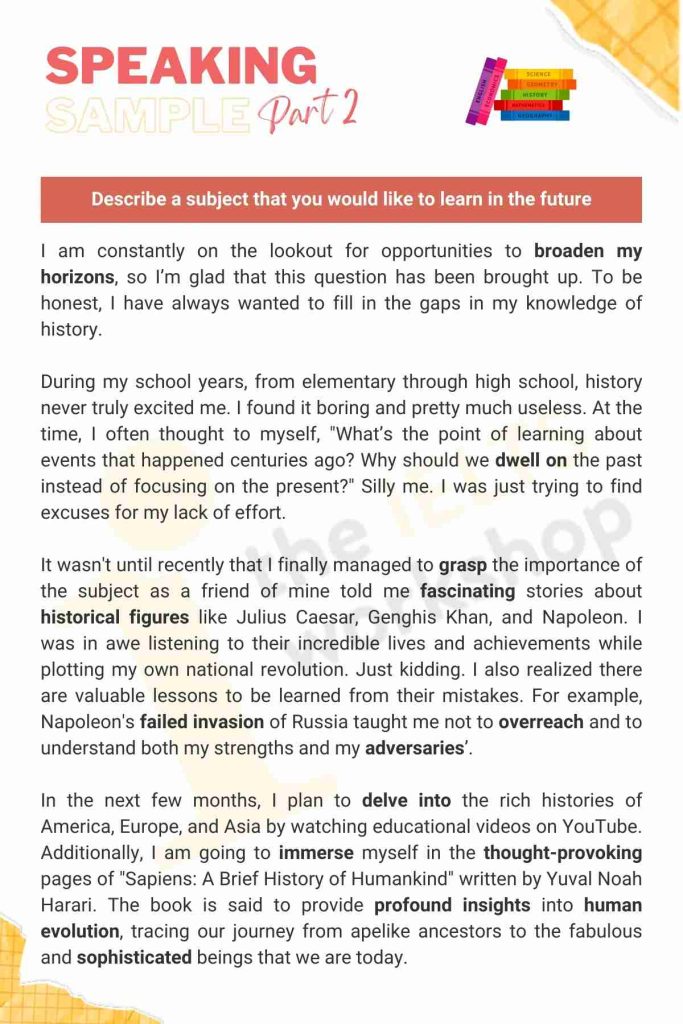

2. Từ vựng (Vocabulary)
- broaden my horizons (idiom) mở rộng kiến thức
- dwell on (ph.v) chăm chú vào
- grasp (v) hiểu được
- fascinating (adj) hấp dẫn
- historical figures: nhân vật lịch sử
- be in awe of: kính nể
- failed invasion: cuộc xâm lược thất bại
- overreach (v) với quá xa
- bite off more than you can chew: không nên làm quá sức
- adversary (n) đối thủ
- delve into (ph.v) nghiên cứu sâu
- immerse (v) đắm mình
- thought-provoking (adj) kích thích tư duy
- profound insights: những hiểu biết sâu sắc
- human evolution: sự tiến hóa của loài người
- sophisticated (adj) phức tạp
- rocky (adj) gập ghềnh
- strenuous (adj) căng thẳng
- resilience (n) sự kiên cường
Part 3:
Bên cạnh Part 2, bạn hãy tham khảo thêm Part 3 cho chủ đề này nhé
What are the differences between online learning and offline learning?
Do you prefer to study alone or with a group of people?
What are the advantages and disadvantages of learning in a group?
What subjects do most young people preter to learn? Why?
What is more important when choosing a job, high salary or interest?
What do you think about face-to-face learning with teachers?
1. What are the differences between online learning and offline learning?
Speaking from experience, I think that online and offline learning differ in many ways. E-learning provides flexibility and convenience, allowing students to access course materials and lectures from anywhere and at any time. However, it may lack personal interaction and require more self-discipline. In contrast, traditional classroom learning offers direct interaction with teachers and peers, which can enhance understanding and engagement through face-to-face communication. It provides a more structured environment and immediate feedback. Nevertheless, it is less flexible than online study, requiring students to adhere to a fixed schedule and location.
- flexibility (n) sự linh hoạt
- convenience (n) sự tiện lợi
- self-discipline (n) tự kỷ luật
- engagement (n) sự tham gia
- adhere (v) bám theo
2. Do you prefer to study alone or with a group of people?
Personally, I’m partial to self-learning since I find that when I’m on my own, I can really focus and avoid distractions. It allows me to set my own pace and schedule, which I find really helpful because I can spend more time on topics I find difficult and breeze through the ones I’m already comfortable with. However, I do see the benefits of studying in a group, especially when it comes to subjects that require discussion or different perspectives. Sometimes, bouncing ideas off others can lead to a deeper understanding. But overall, I feel like I get more done and retain information better when I’m studying by myself.
- distraction (n) sự phân tâm, xao nhãng
- pace (n) tốc độ
- breeze through (ph.v) vượt qua dễ dàng
- perspective (n) quan điểm
- bouncing ideas off: trao đổi ý tưởng
- retain (n) giữ lại (thông tin)
3. What are the advantages and disadvantages of learning in a group?
As I mentioned earlier, there are several benefits that make students choose to study in a group. Firstly, having company gives you motivation and deters you from procrastinating on tasks. Secondly, when you encounter a difficult problem, you’re not on your own and you can seek help from others. For example, a groupmate who excels in a particular subject can explain to you concepts you find challenging, thereby saving you a lot of time and frustration.
Regarding drawbacks, when group members are not focused, conversations can easily drift off-topic, wasting everyone’s time. In addition, group study sessions can be inefficient if there are too many conflicting opinions or approaches to solving problems, which can slow down the learning process.
- motivation (n) động lực
- deter sb from doing st: ngăn cản ai đó
- procrastinate (v) trì hoãn
- excel in (ph.v) xuất sắc trong lĩnh vực
- drift off-topic: đi lạc đề
- inefficient (adj) không hiệu quả
4. What subjects do most young people prefer to learn? Why?
From my observation, youngsters are more inclined to learn subjects that they are good at. Take my high school class as an example, the more active and athletic kids always looked forward to PE lessons while the quite nerds like me just wanted those classes to be over. Conversely, us geeks favored scientific subjects like math, chemistry and physics. The reason is obvious. It’s easier to make progress and receive compliments for something that is right up your alley. Furthermore, students often choose subjects that align with their interests and future career aspirations. For instance, those who are passionate about technology and engineering are likely to enjoy subjects like computer science and robotics. This preference is driven by the desire to develop skills that are both enjoyable and potentially useful in their future professions.
- be inclined to: có khuynh hướng
- nerd ≈ geek (n) mọt sách
- up my alley: đúng sở trường
- align with (ph.v) phù hợp với
- career aspiration: nguyện vọng nghề nghiệp
- passionate (adj) đam mê
- profession (n) nghề nghiệp
5. What is more important when choosing a job, high salary or interest?
To answer this question, we need to weigh the significance of a high income and career interest in a person’s life. Undoubtedly, a well-paying job brings financial stability, personal security, and earns respect from others, as salary often reflects one’s talent and ability. However, true job satisfaction comes from being passionate about your work, turning it from a chore into something enjoyable and fulfilling. When you’re genuinely interested in your job, it adds a richness to life that goes beyond mere financial gain. Therefore, in the long term, it’s essential to prioritize your interests and passions when making career decisions because not only does it bring personal fulfillment but also boosts motivation and productivity.
- weigh (v) cân nhắc
- financial stability: ổn định tài chính
- reflect (v) phản ánh
- prioritize (v) ưu tiên
- personal fulfillment: sự thỏa mãn cá nhân
- productivity (n) năng suất
6. What do you think about face-to-face learning with teachers?
I reckon the traditional classroom setup still reigns supreme for a few good reasons. Firstly, being physically present in a classroom allows teachers to keep an eye on students’ progress in real-time and offer immediate feedback. This kind of instant back-and-forth helps students grasp concepts better and keeps them engaged. Secondly, handing out materials and tangible rewards can make the learning experience more interactive and exciting. Also, with traditional learning, you’re not at the mercy of technology. Even if the internet gets disconnected or the power goes down during the day, teachers can easily switch to old-school methods like using a trusty whiteboard to keep the lesson rolling. And that is the charm of face-to-face learning.
- reign supreme: quan trọng nhất
- back-and-forth (n) trao đổi hai chiều
- reward (n) phần thưởng
- tangible (adj) hữu hình
- at the mercy of: phó mặc cho
- old-school (adj) phong cách cổ điển, kiểu cũ
Bài mẫu bởi cô Phương Anh – Giáo viên The IELTS Workshop
Các bạn có thể tham khảo các bài mẫu IELTS Speaking Part 2 của The IELTS Workshop cũng như tham gia bài test trình độ tiếng Anh và nhận tư vấn lộ trình miễn phí tại đây!
Tham khảo ngay Khóa bổ trợ từng kỹ năng IELTS của The IELTS Workshop để cải thiện kỹ năng Speaking bằng phương pháp Mentor 1-1 nhé.



